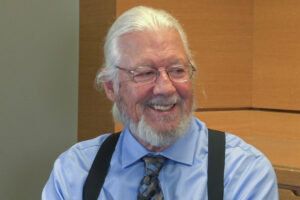Topic: Water Appropriation Act

Interview of Janis Lee, October 14, 2019
Interviewed by Joan Wagnon
Former State Senator Janis Lee's 2019 oral history interview covered her 22 years in the Kansas Senate as well as several years on the Kansas Court of Tax Appeals (formerly the Board of Tax Appeals and later returned to that name). The interview covers many topics, including how she campaigned in a rural district that increased in area over those 22 years, driving as much as 45,000 miles in an election year. Lee developed expertise in tax issues that was important to the agriculture community and in funding rural schools. Water supply was an important issue in her district, Show Moreas was adapting federal regulations so they would work in rural communities. She witnessed the shift to a more conservative legislature and more anti-abortion legislation. Funding for schools dominated most sessions.
Highlight -- short excerpt from the interview
Show Less
Interview of Leland (Lee) Rolfs, October 28, 2019
Interviewed by Rex Buchanan
In this oral history interview recorded in 2019, Lee Rolfs explains that few regulations governed water use when he began working at the Division of Water Resources of the State Board of Agriculture in 1978. He describes how the State responded to depletion of the Ogallala aquifer by creating Groundwater Management Districts (GMD) to manage future development, and to create a comprehensive system to address water issues. Rolfs recalls how the policy positions switched over time from the State being reluctant to regulate groundwater use when the GMDs initially sought restrictions to the opposite, with the GMDs opposing regulations Show Morewhen the State sought to impose them. He recalls his work on ground-breaking litigation with Colorado over water in the Arkansas River (Kansas v. Colorado). That case spanned over 25 years of his career with the State. Rolfs expounds on the Water Appropriation Act and its importance in the development of Kansas and its limitations in addressing the issue of long-term declines in the water table. He observes that cooperation, knowledge, and education are essential for properly managing water in Kansas. Show Less

Interview of Janis Lee and Laura McClure, May 20, 2024
Interviewed by Rex Buchanan
Janis Lee and Laura McClure, both Democrats elected from predominantly Republican districts that overlapped, often campaigned together and conducted constituent communication sessions in the areas they both represented. Because their time in the legislature (1989-2011) and their largely rural districts in northcentral Kansas intersected, Lee and McClure both worked on a wide range of policies pertinent to the Energy & Environment Collection of oral histories: confined feeding facilities, solid waste, waste tires, water quality standards, the Kansas v. Colorado lawsuit, and the Water Transfer Act that the city of Hays was exploring at the time of this interview, among Show Moreothers. In the energy arena, significant issues during their time of service in the Kansas Legislature included retail wheeling of electricity, gas pollution remediation, well plugging, and gas-gathering systems regulations. In this May 2024 interview, they explore those issues, the dynamics of the legislature, campaigning, and the work involved in serving in the legislature. Show Less
